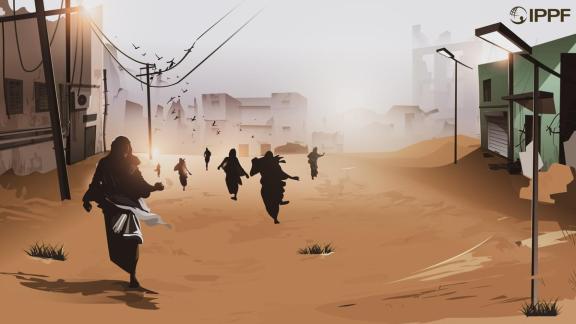The Sudanese Family Planning Association is following with great concern the repercussions of the deteriorating humanitarian situation in eastern Sudan, resulting from the massive wave of displacement caused by the violations and crimes committed by the Rapid Support Militia (RSM) in the villages of East Gezira and neighboring areas. This violence has led to the largest displacement since the outbreak of the conflict on 15 April 2023, with thousands flocking to Gedaref and Kassala states and their various localities.
The large-scale displacement has put enormous pressure on basic resources and services, leaving women and girls in extremely precarious health conditions, especially in relation to primary and reproductive health care. According to the Family Planning Association's monitoring, several cases of gender-based violence, including physical and sexual assaults, have been recorded, further increasing the suffering of displaced women and girls, exacerbating their psychological and physical conditions.
Hundreds of displaced women in shelters suffer from a severe lack of reproductive health services, as many of these centers lack basic health facilities that meet the urgent needs of women. Miscarriages have increased due to the lack of proper medical care, and several maternal deaths have been recorded due to poor pregnancy and childbirth care, as well as inadequate newborn care, increasing maternal and neonatal mortality rates.
The lack of hygiene facilities and necessary medical equipment increases the risk of infectious disease outbreaks, exacerbating the health conditions of the displaced. Despite the efforts of international and local relief organisations in coordination with government agencies in Gedaref and Kassala states, the response is still insufficient to meet the growing needs in these affected areas.
The Sudanese Family Planning Association is committed to continuing its work with international partners, such as the International Planned Parenthood Federation (IPPF), the United Nations Population Fund (UNFPA) and UNICEF, to provide essential support to women and girls in the shelters. The association is currently working on distributing personal hygiene kits and developing reproductive health support programmes, as well as providing medical care services through mobile clinics and mobile medical teams to deal with emergency cases and reduce the health burden on displaced women.
The Association calls on all governmental and international bodies to strengthen their efforts to address this humanitarian crisis and intensify urgent support to ensure that women have access to basic health care and reproductive care, contributing to the preservation of their lives and safety amid these critical circumstances.
For more information and to speak to one of our staff Sudan, please email media@ippf.org
About the Sudan Family Planning Association
The Sudan Family Planning Association (SFPA) was established in 1965 by pioneers in obstetrics and gynaecology in response to increases in maternal, neonatal and infant mortality and morbidity. As the statistics show, Sudan is a country in great need of frontline sexual and reproductive health (SRH) services. Advocacy, and undertaking information, education and communication (IEC) programs are critical.
About the International Planned Parenthood Federation
IPPF is a global healthcare provider and a leading advocate of sexual and reproductive health and rights (SRHR) for all. Led by a courageous and determined group of women, IPPF was founded in 1952 at the Third International Planned Parenthood Conference. Today, we are a movement of 150 Member Associations and Collaborative Partners with a presence in over 146 countries. Our work is wide-ranging, including comprehensive sex education, provision of contraceptives, safe abortion, and maternal care and responding to humanitarian crises. We pride ourselves on being local through our members and global through our network. At the heart of our mission is the provision of – and advocacy in support of – integrated healthcare to anyone who needs it regardless of race, gender, sex, income, and crucially no matter how remote.
Our services are available to all, and reach the most marginalised groups in societies, including key and priority populations, youth, and people with disabilities. Most of our MAs have special programs to engage youth (10-24) inside and outside of school settings. Because our clinics offer comprehensive services, attending our clinics is non-stigmatizing and does not label people as having a particular disease or membership to a particular group. This model of services that are integrated and open to all, embedded in indigenous, locally owned organisations, is ideal for ensuring that the most vulnerable and marginalised groups can access the HIV prevention services they need.
when







